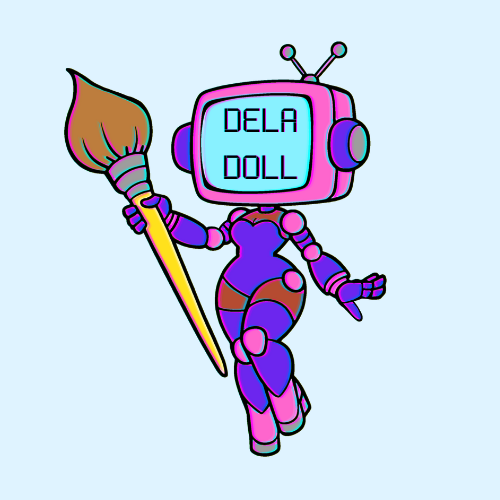I have some mixed feelings. Initially, I was cautiously enthused (an oxymoron, I know) about the fact that there would be a fourth Powerpuff Girl, and that she would be black. I’m one of those people that gets sad when a story ends. I always want universes to keep building upon themselves and giving me something new (within reason), and so I’m not totally against every single change. Overall, I’m happy to see a Powerpuff Girl with my skintone. As advocate for more diverse media representation, though, it’s not enough to just be satisfied that she’s got darker skin; the quality of the character and the representation itself is critical to determining whether or not Bliss (and any other “new” characters introduced to our favorite media) is a reason to celebrate. To me, it’s not enough that she’s there; what she’s doing and how she’s portrayed matters. With this in mind, did I end up feeling Blissful about Bliss after watching The Power of Four?
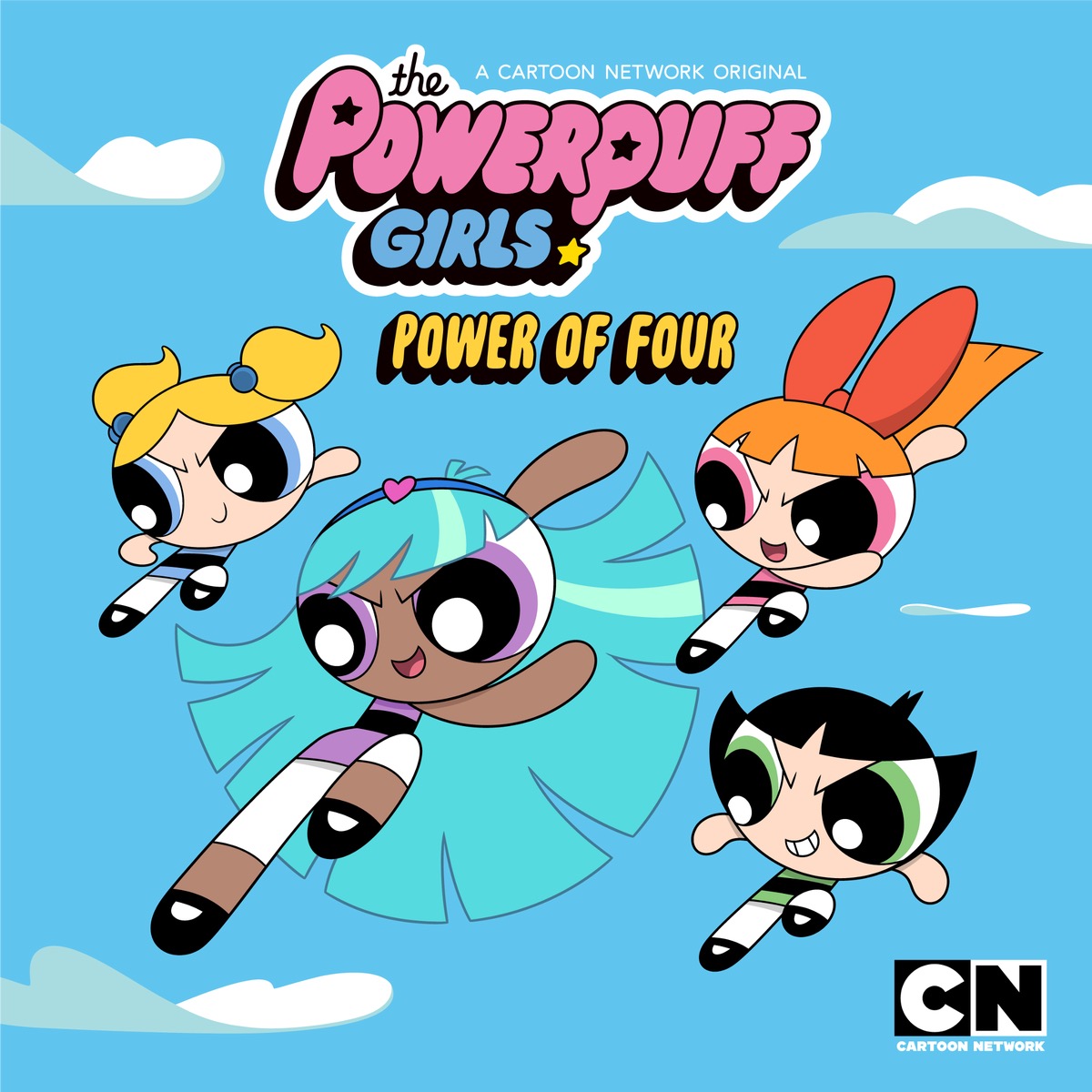
Origin Story
It turns out that the Powerpuff Girls aren’t the first batch of super-children that Professor Utonium whips up in his effort to create “the perfect little girl.” 10 years before Blossom, Bubbles, and Buttercup were even a thought, there was Bliss. The circumstances of her creation were nearly identical to theirs: She’s made of sugar, spice, everything nice, and an accidental helping of Chemical…W. All goes well until it’s revealed that Bliss doesn’t always have a handle on her powers: they unintentionally manifest as explosions whenever she’s experiencing intense emotions.
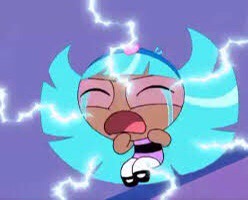
She and the Professor live a happy domestic life as father and daughter for a while. Unlike the trio of girls we’ve come to know and love over the years, Bliss refers to him as “Dad” as opposed to “Professor”. Eventually, however, Bliss accidentally blows up their home and vanishes in shame and horror at her own powers, leaving the Professor childless and heartbroken until he creates the Powerpuff Girls 10 years after Bliss’s disappearance.
What Bugs Me:
The Professor isn’t shown as making an effort to find Bliss after she disappears, so he looks like a hugely shitty father. Maybe the writers will expand on this in the future, but as it stands, Professor Utonium looks like a shitty dad. We’re still missing 10 years worth of information on what he was doing between her disappearance and the creation of the Powerpuff Girls, so there’s a little hope that we’ll gain some insight in future episodes. As it stands, Professor Utonium can eat a whole dick because he’s clearly an unfit parent. I mean, he’s been letting his kindergarten daughters fight monsters and vicious criminals for years. Additionally, it turns out that he may have even more super-powered children, as it’s revealed that he went through 22 other experiments similar to the ones he used to create Bliss, Blossom, Bubbles, and Buttercup. If that’s the case, where the hell are the others? I’m concerned, so in light of this new information, Professor Utonium ain’t shit.
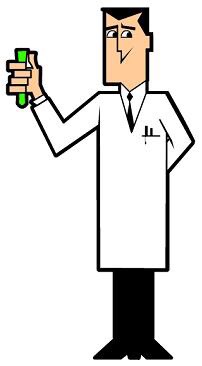
What Intrigued Me:
I’m sure that there’s an expectation for me say that I’m bothered by Bliss’s portrayal as an emotionally unstable (read: angry?) black girl…but I’ve never been much of a liar. The truth is that I’m not bothered at all. In fact, as someone who has dealt with anxiety (and related issues) for most of their life, I found it more relate-able than anything. Bliss’s instability is initially beyond her control. She’s not out to hurt or punish anyone, and is shown as being an overall caring and likable person. She’s even described by the Professor as “sweet, strong, and incredibly smart,” but her issues get in the way of her being able to fully realize her potential and put these amazing traits on display. Eventually, she becomes so overcome self doubt, guilt, and anxiety, that she isolates herself from the only family she’s ever known, because she believes she’ll never gain control. Anyone who has dealt with anxiety or other forms of mental illness can heavily relate to this. It’s familiar territory.
For his part, the Professor realizes there’s a problem, but thinks just loving her is enough. Instead of making an active effort to address it and help Bliss learn healthy coping mechanisms, he ignores it and walks on eggshells around her. When I was at a really dark point in my life, this is how it was for me. The people that loved me tiptoed around me because they knew something was wrong but didn’t know how to deal with it. I didn’t know how to even express how I was feeling, and so it led to outbursts and eventual isolation. In this state my only companion was a voice of negativity, armed with self-deprecation and doubt. Similarly, Bliss decides that she’s better off alone, on a shitty island (literally, it’s called Bird Poop Island) where her only friend is a tiny elephant named “Me,”who is actually Him (arguably the most evil and fierce PPG villain) who reinforces her negative ideas about herself and wants to keep her away from her family and realizing her potential.
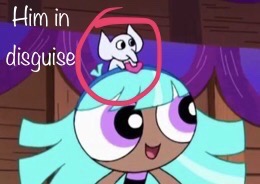
I could go on and on about how Bliss’s issues with controlling her powers serve as a metaphor for mental illness and the difficulties that come with being “different,” but I think you get the idea. When Bliss starts to see herself as a someone worthy of love, with the potential to be a hero, she begins to gain better control of her powers. Still, she lapses, especially when the Professor expresses concern and skepticism at her ability to use her powers without hurting anyone. I can’t even begin to tell you how shitty it feels when you’re having a great mental health day and someone brings up your issues. When this happens, the sinister voice of Me shows up to further send her into a spiral of chaos. When she finally sees Me/Him for the evil creature he actually is and is freed from his influence, she becomes unstoppable.
Suffice it to say that I don’t see this as an “angry black girl” stereotype of narrative.
In fact, Bliss is shown to be more sensitive and caring than anything else. She happily accepts her role as big sister. She is concerned for the welfare of others, even to the (misguided) point of being willing to isolate herself for their safety. She’s also loved by all of the main characters. The Professor implies that she was his “favorite.” Blossom, Bubbles, and Buttercup are immediately fond of her. Even Mojojo puts aside his grudge with the Powerpuff Girls to help rescue Bliss from the clutches of Me/Him because he and Bliss were friends before she ran away, and he still cares for her. She’s not a 1-dimensional archetype, and she isn’t written off as one.
Character Design (But Really Let’s Talk About How She’s Black)
I personally don’t mind Bliss’s character design. Her lack of a natural hair color shouldn’t be much of an issue in a superhero show featuring crime fighting little girls, a demonic lobster man, and Godzilla-styled mega monsters. Her skintone obviously isn’t an issue for me, but it’s been the main point of controversy for many. Hoards of internet voices have cried out in disapproval over Bliss’s brown skin citing reasons like imaginary diversity quotas and anger at “making everything racial and politically correct.” I have to laugh at this. The original Powerpuff Girls was blatantly feminist and progressive, so it amazes me that people feel the addition of a black character is just too much. Violence is fine. Pushing an overtly feminist agenda is fine (it’s fine with me, honestly!). But…BLACK PEOPLE? That’s somehow just too political, too liberal, and too far. Cue the rolling of my eyes.
I honestly just wish people would be honest and say that seeing black people in the mainstream media, especially outside of traditional and stereotypical roles, makes them uncomfortable. The first step to recovery is admitting that you have a problem. It’s fascinating to me that I’ve seen so many people preface their disdain with stating that they don’t have a racist bone in their bodies and then following this declaration with “Why did they have to make her black?” “I don’t see the point of her being black. “They only made her black to be politically correct” “They’re just forcing diversity down our throats”, along with numerous cries of evil liberal motives and propaganda. Clearly, her blackness is an issue. Why is a black character’s mere existence seen as pushing a radical liberal agenda? What agenda would that even be? That black people exist? That superheros can be black? That black girls deserve to see themselves reflected in the mainstream media? How is any of that offensively or unbearably political?
The short answer is that it’s not. The truth is that most people just prefer a totally segregated media. The majority of mainstream media in America is overwhelmingly, often unrealistically, white. If a show features predominantly black characters, it’s assumed that it’s only for black people. Meanwhile, anything with white people is supposed to be for everyone…but shouldn’t include everyone. Whenever a black character is introduced into a predominantly white show, there’s outcry about the evils of “political correctness” and “forced diversity.” It’s interesting to note that we’re often told “race doesn’t matter” when protesting and discussing cases of whitewashing, but when completely new black (or queer, or femme, or other POC) characters are created and added to preexisting media, race suddenly matters a lot. Race is only irrelevant so long as the status quo of predominantly white and racially homogeneous media is maintained. It’s another story entirely when white audiences are forced to endure the unspeakable horror of…looking at black people, I guess. Somehow, the presence of a black character is inherently political, radical, liberal, forced, and “making everything about race.”
Interestingly enough, Bliss’s skin color is never even mentioned in the special. At no point did it serve as either a major or minor plot point in the show, which makes cries of “making the show about race” seem foolish. Bliss’s story-line was that of a girl learning to love herself and realize her potential. She’s also black, but that’s really not the focal point. There’s no overtly political messages. No “liberal propaganda.” It doesn’t feel anymore forced than it would if she’d been white like the other girls.
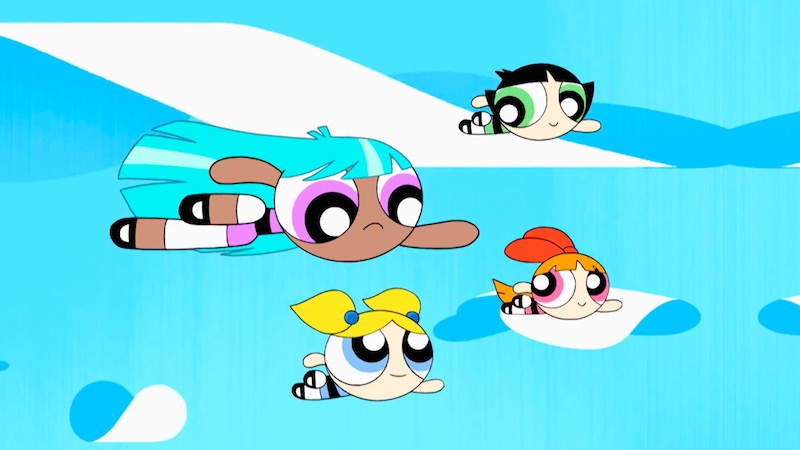
Even More On That Issue
On the other side of the “Bliss is black and that’s a problem” coin, there are those who argue that they want to see more diversity, but don’t want to see new characters being added to preexisting, popular media. I understand wanting to avoid seeing these characters become disposable jokes and 1-dimensional afterthoughts, and I support the creation of entirely new media that features diverse characters from the start; however, I don’t understand why we can’t be happy about the addition of new characters (a new black character) to our favorite show and fictional universes. It takes a lot of time to build an audience, so while I support, and am even working to create, completely fresh stories with a diverse range of characters, I’m not against the idea of updating and adding to the media we already consume in order to meet the needs of a more diverse audience. As long as the end result is quality representation the doesn’t turn the new character into a glorified houseplant or glaring stereotype, I’m not going to object to it entirely. Yes, I absolutely want to avoid tokenism, and I want new shows, movies, and games with black characters (and Latino, and Asian, and queer, and…you get the idea. I want more than straight white people), but it’d be extremely counterproductive to automatically reject characters like Bliss on that basis alone.
In Bliss’s case, while not a perfect intro, I feel like she’s ultimately a character worth keeping around, and I’m fully prepared to call the writers on any bullshit. Time will tell whether or not we’ll see more of her as a valued character. As it stands, there’s potential for continued meaningful representation with her character.
Final Thoughts
- There’s been a significant amount of talk surrounding Bliss’s body type, with accusations of trying to sexualize a child character because she’s black based on the fact that she is taller than the other girls, with wider hip. It is explicitly stated that Bliss is a teenager, 10 years older than the other Powerpuff Girls. Personally, I don’t feel like she’s a caricature of society’s idea of black girls’ silhouettes because the style is consistent with how Blossom, Bubbles, and Buttercup were depicted as teens in the original series. In fact, it’s a much more modest portrayal compared to how they were drawn.
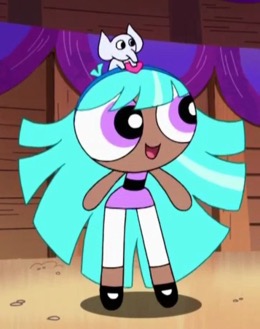
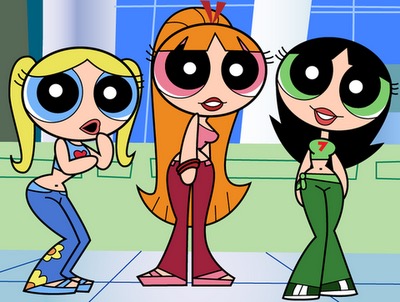
- A lot of the arguments that Bliss is just a negative stereotype appear to be made by people who either haven’t even bothered to watch the special, or are reaching hard to apply stereotypes to her. I understand being apprehensive, but going out of your way to find problems and turn a decent and promising character into a Jar Jar Binks is pretty silly. I get not liking the series as much as the original (I prefer the original but mostly enjoy the reboot), but letting your bitterness at the fact that it’s not a carbon copy continuation of the original cause you to be completely biased and blind makes you hard to take seriously
- The Professor ain’t shit. I can’t say that enough. What a garbage dad. I really don’t like how he didn’t look for her (as far as we know). It’s not a good look. In the past, the Professor has gone looking for the other girls when they went missing, so one has to wonder why he didn’t do the same for Bliss. The argument can be made that Bliss was possibly his first successful experiment/child and he didn’t know as much because he was younger and inexperienced as the father of a superhuman child, and that the loss of Bliss is what motivated him to make sure he never lost another one. It’s valid but…are we really trying to give him that much credit? Debatable. It, however unintentionally, sends the message that the black child wasn’t worth looking for, which is inexcusable. His eagerness to have her back doesn’t entirely make up for it, and like I said, we’re missing 10 years worth of information concerning what he was up to between her running away and the birth of the Powerpuff Girls. In an ideal world, the writers will expand on this. But, ya know. Maybe not.
- People having a problem with Bliss’s blue hair is hilarious to me. A show starring little girls with super powers, who’s villains include a talking monkey and an anthropomorphic, gender non-conforming demon lobster should totally commit to making sure it’s characters all have natural hair colors, right? Nah.
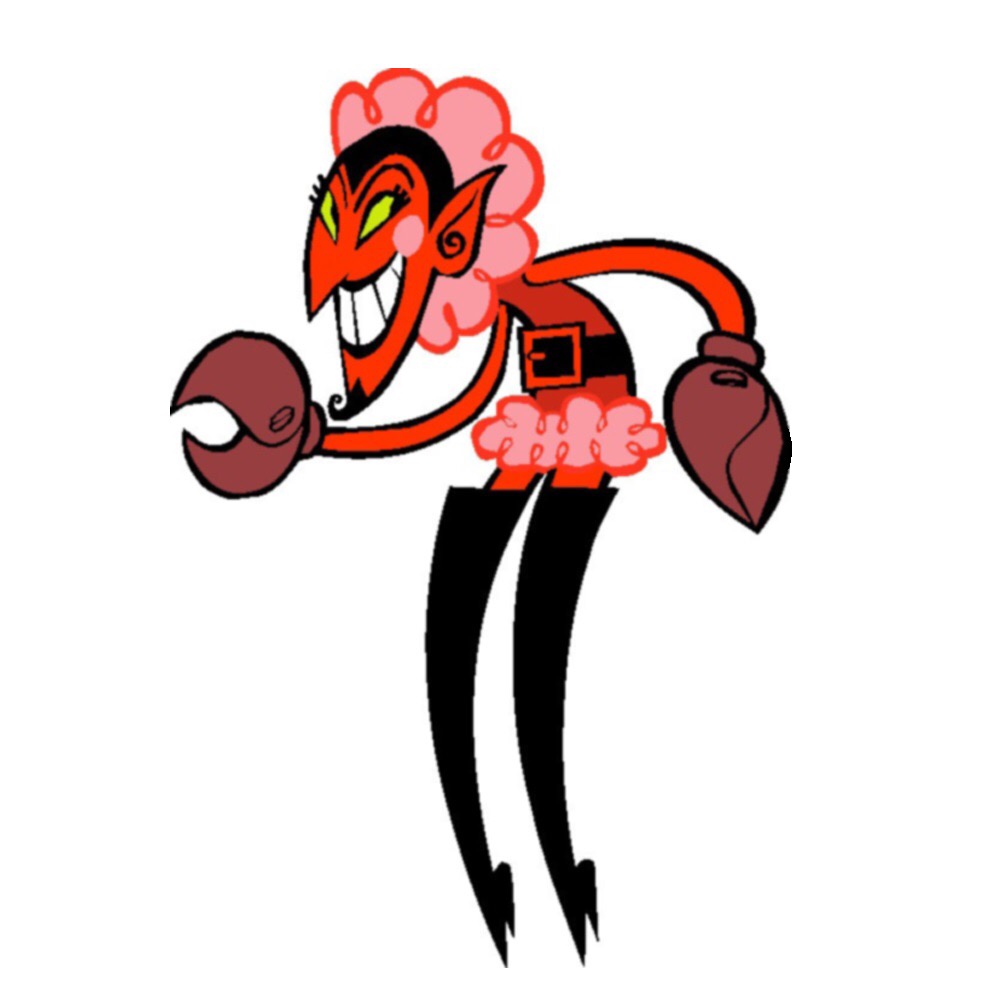
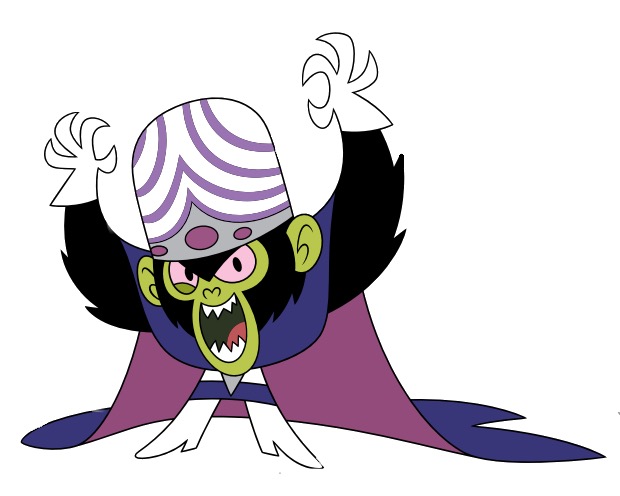
- What’s up with the Professor’s obsession with the letter “B”?
- The ending in which Bliss has to go push Saturn back into place (him pulled it out of orbit in hopes of using it to destroy the world) irked me. The Powerpuff girls could have gone along. It doesn’t seem like that big of a mission considering their combined strength. The Professor asked her to “come home soon,” which shows promise that she’ll return, but I’m still irritated as fuck. It feels like an excuse not to bring her back as a main character, but I hope it isn’t. If that turns out to be the case, you can bet I’ll be the first to call bullshit and rip everyone involved in that horrible decision a new, gaping asshole. But let’s just hope for the best so I won’t have to do that!
Overall, Bliss as a character seems pretty solid as it stands. My daughter and I enjoyed the special, and it should be noted that she’s part of the primary target audience. She was happy to see a Powerpuff Girl with brown skin. For my part, I’m happy to see that Bliss isn’t a stereotype or walking embodiment of the angry black girl trope and other negative images that often bring down black character. I want to see more of her in the near (more like “immediate”) future. In the meantime, I’m gonna cosplay her.
~DeLa Doll
Insta📸. Patreon🖌. Facebook👥. If you liked this article, consider supporting my writing and cosplay work on Patreon! For just $1, you instantly get access to exclusive content!
DeLa Doll is a multifaceted artist, writer, and creator with a passion for bold self-expression. With a background in professional writing, nail artistry, and makeup, she brings a unique perspective to beauty, creativity, and storytelling. As the driving force behind DeLa Doll, she blends artistry with authenticity, sharing her journey of entrepreneurship, self-discovery, and growth. Whether crafting luxury press-on nails, exploring media through a critical and creative lens, or documenting her evolving artistic vision, DeLa Doll invites her audience into a world where imagination meets intention.
